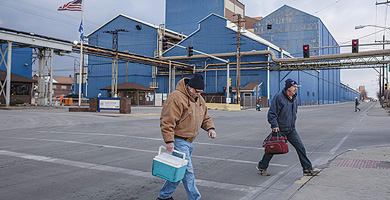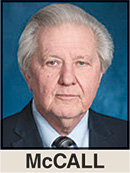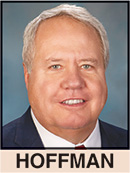By ELIZABETH DONALD
Illinois Correspondent

Granite City, IL – U.S. Steel may have new overseas owners, in a surprise announcement on Dec. 18 that has union leaders raising concerns.
U.S. Steel (USS) announced it will be purchased by Japanese-based Nippon Steel, which was not the union’s preferred purchaser. Once the largest company in the world and a historic symbol of American industry, the 122-year-old company has been dealing with purchasers welcomed and unsolicited for the last several months.
 United Steelworkers (USW) International President David McCall slammed the proposed deal in a statement released the same day.
United Steelworkers (USW) International President David McCall slammed the proposed deal in a statement released the same day.
“To say we’re disappointed in the announced deal between U.S. Steel and Nippon is an understatement, as it demonstrates the same greedy, shortsighted attitude that has guided U.S. Steel for far too long,” McCall said. “We remained open throughout this process to working with U.S. Steel to keep this iconic American company domestically owned and operated, but instead it chose to push aside the concerns of its dedicated workforce and sell to a foreign-owned company.”
McCall said neither U.S. Steel nor Nippon reached out to USW regarding the deal, which he says is a violation of the partnership agreement that requires U.S. Steel to notify the union of any change in control or business conditions. Based on this, he said he does not believe Nippon understands the full breadth of the union contracts and agreements, nor does he know whether it has the capacity to live up to the existing contracts for day-to-day commitments and the significant obligations to fund pension and retiree insurance benefits.
COLLECTIVE BARGAINING AGREEMENTS
Nippon said in a statement that it would honor all collective bargaining agreements, according to the St. Louis Post-Dispatch. It is offering $55 a share for a $14.1 billion offer, a 40-percent profit on U.S. Steel’s closing stock price last week. Nippon is also assuming U.S. Steel’s debt, bringing the price up to $14.9 billion.
USW had backed a different bidder: Cleveland-Cliffs, a steelmaker based in Cleveland, Ohio that had put forth an unsolicited $7.25 billion bid for U.S. Steel. Although it was the only potential purchaser with the support of the steelworkers’ union, Cleveland-Cliffs did not gain the support of the Alliance for Automotive Innovation, which represents General Motors, Toyota, Volkswagon, Hyundai and other major automakers. Alliance CEO John Bozzella had sent an open letter to lawmakers, the Federal Trade Commission and the U.S. Department of Justice Antitrust Division in October, arguing that if Cleveland-Cliffs bought U.S. Steel, costs for car production would go up and there would be no competition for the metal known as e-steel, which is needed for electric vehicle motors.
‘DISAPPOINTED’
U.S. Rep. Frank Mrvan (D-Ind.), vice chairman of the Congressional Steel Caucus, said he was “adamant” that all federal anti-trust regulators and the Committee on Foreign Investment in the United States would be “scrupulous” in their assessments.
“I am abjectly disappointed that a foreign entity with a history of untrustworthy trade actions is exploiting American workers and members of Organized Labor to benefit the executives of U.S. Steel,” Mrvan said. “Since day one, I have stood with Labor and voted to support transformational federal investments in the American steel industry, and now that we are poised for robust growth in the coming months and years from these actions, we must not allow foreign ownership of U.S. Steel to jeopardize the strength of our economy, our national security, and the livelihoods of steel-producing communities throughout our nation.”
For local steelworkers, the news is yet another surprise in a season full of unpleasant announcements.
In September, hundreds of Granite City steelworkers were “temporarily” laid off, but in late November U.S. Steel announced that the Granite City plant would be idled indefinitely and issued WARN notices to more than 1,000 employees. Government officials and union workers denounced the way the layoff was handled and the Illinois Department of Labor issued subpoenas to investigate whether U.S. Steel attempted to circumvent the WARN Act to avoid giving proper notice to the workers.
‘NOT CONDUCTED AS IT SHOULD HAVE BEEN’
USW Local 1899 President Dan Simmons sent a letter to his membership agreeing with McCall’s assessment of the Nippon deal.
“This entire process was not conducted as it should have been, but rather in typical USS fashion of keeping the union in the dark, only to inform us after the fact while releasing the news to the media,” he said.
 Simmons said the Granite City union local had welcomed the opportunity to embrace a new owner with “a fresh vision” for Granite City’s Steel Works, so this announcement is another disappointment.
Simmons said the Granite City union local had welcomed the opportunity to embrace a new owner with “a fresh vision” for Granite City’s Steel Works, so this announcement is another disappointment.
“We now find ourselves facing a new owner with the same USS leadership and business plan that, frankly, got us here in the first place,” Simmons said. “That being the case, I only hope as new owners, Nippon brings with them plans to utilize their known technology and a commitment to continue operations at Granite City Works as an exceptional steel producer well into the future.”
PROTECT FAMILY- SUSTAINING JOBS
McCall said the International Union intends to exercise the full measure of its agreements to protect “the good family-sustaining jobs we bargained.” He also intends to strongly urge government regulators to carefully examine the acquisition.
“No union has actively engaged in more acquisitions in its core industries than the USW, and rest assured, our union will hold management at U.S. Steel accountable to every letter of our collective bargaining and other existing agreements,” McCall said.
LISTEN TO UNION WORKERS
Local elected officials also issued statements calling for Nippon to listen to union workers and be clear on what it means for Metro-East steelworker families.
 “It’s troubling that the advocates for workers have so far been denied a seat at the table,” said state Rep. Jay Hoffman (D-Swansea). “Whether this deal goes through or not, it would be prudent of U.S. Steel’s leadership to reconsider recent actions directed toward Granite City and its dedicated, highly skilled workforce. This plant and its people have brought significant value to the industry for decades, and it can continue to be a strong investment for years to come.”
“It’s troubling that the advocates for workers have so far been denied a seat at the table,” said state Rep. Jay Hoffman (D-Swansea). “Whether this deal goes through or not, it would be prudent of U.S. Steel’s leadership to reconsider recent actions directed toward Granite City and its dedicated, highly skilled workforce. This plant and its people have brought significant value to the industry for decades, and it can continue to be a strong investment for years to come.”
 State Rep. Katie Stuart (D-Edwardsville) said she and other Democratic leaders remain committed to a future for U.S. Steel in Granite City. “USW has expressed deep concerns that must be satisfactorily addressed to ensure that our steel families get a resolution that is both workable and dignified,” she said. “We will be closely monitoring this process as it goes forward, and we will continue to insist that this be a good deal for workers, not only investors.”
State Rep. Katie Stuart (D-Edwardsville) said she and other Democratic leaders remain committed to a future for U.S. Steel in Granite City. “USW has expressed deep concerns that must be satisfactorily addressed to ensure that our steel families get a resolution that is both workable and dignified,” she said. “We will be closely monitoring this process as it goes forward, and we will continue to insist that this be a good deal for workers, not only investors.”
 U.S. Rep. Nikki Budzinski (D-Illinois) said she’s been urging U.S. Steel to invest in Granite City and its workforce for the last year, as well as holding them accountable for the WARN Act.
U.S. Rep. Nikki Budzinski (D-Illinois) said she’s been urging U.S. Steel to invest in Granite City and its workforce for the last year, as well as holding them accountable for the WARN Act.
“As news of a possible acquisition came to light over the last several months, I shared the hopes of Granite City workers that an American-owned company with strong Labor relations could buy U.S. Steel and invest in a bright future at Granite City Works,” she said. “Today’s news of a foreign acquisition falls short of those hopes and leaves the future of this critical plant in jeopardy. As this deal moves forward, my commitment to our steelworkers remains the same: I’ll continue pushing for investment in the working men and women of Granite City.”
According to a historical retrospective by CNN, U.S. Steel was founded by financiers J.P. Morgan and Charles Schwab in 1901 by combining their Federal Steel with the company owned by Andrew Carnegie. It was the first company to be valued at more than $1 billion, which at that time was double the entire U.S. budget for that year, and made Carnegie the richest man in the world. Its relationship with Labor goes all the way back to the beginning, as the retrospective included images of striking workers outside the U.S. Steel plant in Gary, Ind. in 1919; and in Homestead, Penn. during the 1946 strike in which 750,000 workers walked out, shutting down 1,200 plants in 30 states.


